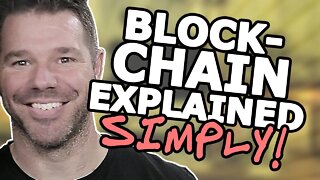Premium Only Content

This is How the US CONSTITUTION Began | SIMPLY Explained
The Constitution sets up the structure of the federal government and divides power between the legislative, executive, and judicial branches. It also spells out the rights and freedoms of the American people and tells the 50 states what powers they can keep as sovereign nations. If a law passed by the federal government or by one of the states goes against the Constitution, it is not constitutional and doesn't apply.
History of the Constitution
In the early 1600s, English Pilgrims crossed the Atlantic Ocean to start settlements (colonies) along the eastern coast of the North American continent. During the first 100 years, relations between England and the colonies were good for both sides and worked well. While the colonies stayed loyal to England and ran on their own, England gave them military protection, a way to handle money, and a place to trade goods. But when George III became King of England in 1760 and started imposing harsh laws, taxes, and trade restrictions on the colonies, many colonists' feelings toward England changed from friendship to anger and hostility. The slogan "No Taxation Without Representation" showed how worried they were about the new King and his new rules and taxes, which they thought were being put on them without giving them a chance to be heard in the British Parliament. A famous event called "The Boston Tea Party" shows how worried the colonists were. A group of colonists dressed up as Native Americans, boarded British ships that brought tea to the colonies, and dumped the tea into the Boston Harbor to protest a British tax on imported tea. In response, the British Parliament passed a set of laws called "The Intolerable Acts of 1774" by the colonists. One of these laws said that ships couldn't go in or out of Boston Harbor until the colonies paid England back for the lost tea. Another law said that the colonists had to let the English soldiers into their homes when they came to put down the rebellion.
-
 5:22
5:22
Ten Ton Online
3 years agoHow Does Blockchain Work - Simply Explained! @TenTonOnline
6 -
 LIVE
LIVE
Wayne Allyn Root | WAR Zone
7 hours agoWatch LIVE: The War Zone Podcast with Wayne Allyn Root
37 watching -
 9:23
9:23
Red Pill MMA
10 hours agoCharlie Kirk Turned on Israel—Candace Has the Receipts!
1061 -
 1:55:29
1:55:29
Redacted News
2 hours agoCharlie Kirk's Text Messages CONFIRMED ACCURATE by TPUSA, Days Before Assassination | Redacted News
99.2K79 -
 1:02:11
1:02:11
DeVory Darkins
1 hour ago $3.58 earnedDemocrats suffers ANNIHILATION during heated hearing with Bondi as Jack Smith bombshell drops
6.99K25 -
 40:59
40:59
Dad Saves America
23 hours ago $0.66 earnedThe Radical Left’s True Romance: Revolution & Chaos
4.95K8 -
 1:07:42
1:07:42
vivafrei
5 hours agoJack Smith SPIED on GOP Lawmakers? Ottawa Trucker Protest Organizers SENTENCED! & MORE!
105K42 -
 LIVE
LIVE
LFA TV
20 hours agoLIVE & BREAKING NEWS! | TUESDAY 10/7/25
949 watching -
 2:00:50
2:00:50
The Quartering
4 hours agoPam Bondi GRILLED, CIA Coverup, DEI Backfire & Taylor Swift Cancelled!
116K47 -
 1:25:13
1:25:13
Awaken With JP
5 hours agoKirk Conspiracies Heat Up, Netflix Castrates Itself, and More!
60.6K51
